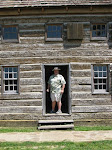 |
| Frederick Delius Jelka Rosen Delius, 1912 |
Many years ago I had the opportunity to sit alone on a dock immersed in a Florida sunset across the St Johns River not far from Solano Grove. The following music was in my head.
Today, with renewed interest in his music the Delius recording catalog has never been larger in spite of the music being some of the most difficult to realize in performance. Here is a fine Telegraph article by the cellist, Julian Lloyd Webber, about Delius and the current revival.
In 1929 The New York Times wrote this about the composer:
Delius belongs to no school, follows no tradition and is like no other composer in the form, content, or style of his music.
Almost a century later the quote remains very much intact.
Photos and Illustrations:
Delius portrait, by his wife, Jelka Rosen, painted in Grez-sur-Loing, France, 1912. Grainger Museum, University of Melbourne, Australia
Text:
The Delius Society, website and Facebook page
Mary E. Greene, Before the Champions: Frederick Delius' Florida Suite for Orchestra, M.A. Thesis, University of Miami, 2011
Radio Swiss Classic, Frederick Delius
wikipedia.org,, Frederick Delius
Delius portrait, by his wife, Jelka Rosen, painted in Grez-sur-Loing, France, 1912. Grainger Museum, University of Melbourne, Australia
Text:
The Delius Society, website and Facebook page
Mary E. Greene, Before the Champions: Frederick Delius' Florida Suite for Orchestra, M.A. Thesis, University of Miami, 2011
Radio Swiss Classic, Frederick Delius
wikipedia.org,, Frederick Delius
















